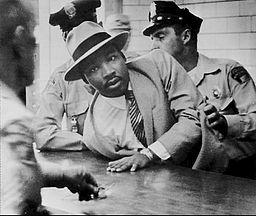Martin Luther King Jr., just 30 years old but already recognized nationally as a leader of the civil rights movement, walked onto the stage of Bushnell Memorial Hall on May 7, 1959.

In a speech entitled, “The Future of Integration,” King pointed to the U.S. Supreme Court’s ruling five years earlier that state laws establishing separate public schools for black and white students were unconstitutional:
“As a result of that decision, we stand today on the threshold of the most creative and constructive period of our nation’s history. To put it in Biblical terms, we’ve broken loose from the Egypt of slavery, we’ve moved through the wilderness of ‘separate but equal,’ and now we stand on the border of the promised land of integration.”
Since King’s talk was part of lecture series organized by the University of Hartford (itself just two years old at the time), the University has kept these audio excerpts from that night on its website.
King began his talk by recalling how he came to Connecticut in the summer of 1944 to pick tobacco in Simsbury. It was his first time outside the segregated South, and the way he was treated–especially on his weekend trips into Hartford–was far different than what he experienced at home. In a letter to his mother at the time, he wrote: “I never thought that a person of my race could eat anywhere but we ate in one of the finest restaurants in Hartford. And we went to the largest shows there.” (For more on King’s time in Connecticut, see this 2014 Associated Press article.)
The Bushnell wasn’t King’s only stop in Hartford that day in 1959. He also spoke at an interdenominational brown-bag lunch at the Asylum Hill Congregational Church and met with editors of the University of Hartford’s student newspaper. The editors included Reid MacCluggage, who went on to become managing editor of the Hartford Courant, publisher and editor of The Day of New London, and a U of H regent.
“I came away from that day knowing I had been in the presence of a great man,” MacCluggage recalled for the University in 2006, adding that “to many of us in the 1950s, the civil rights movement was only a Southern issue. Dr. King corrected that impression. Civil rights was a human issue.”
